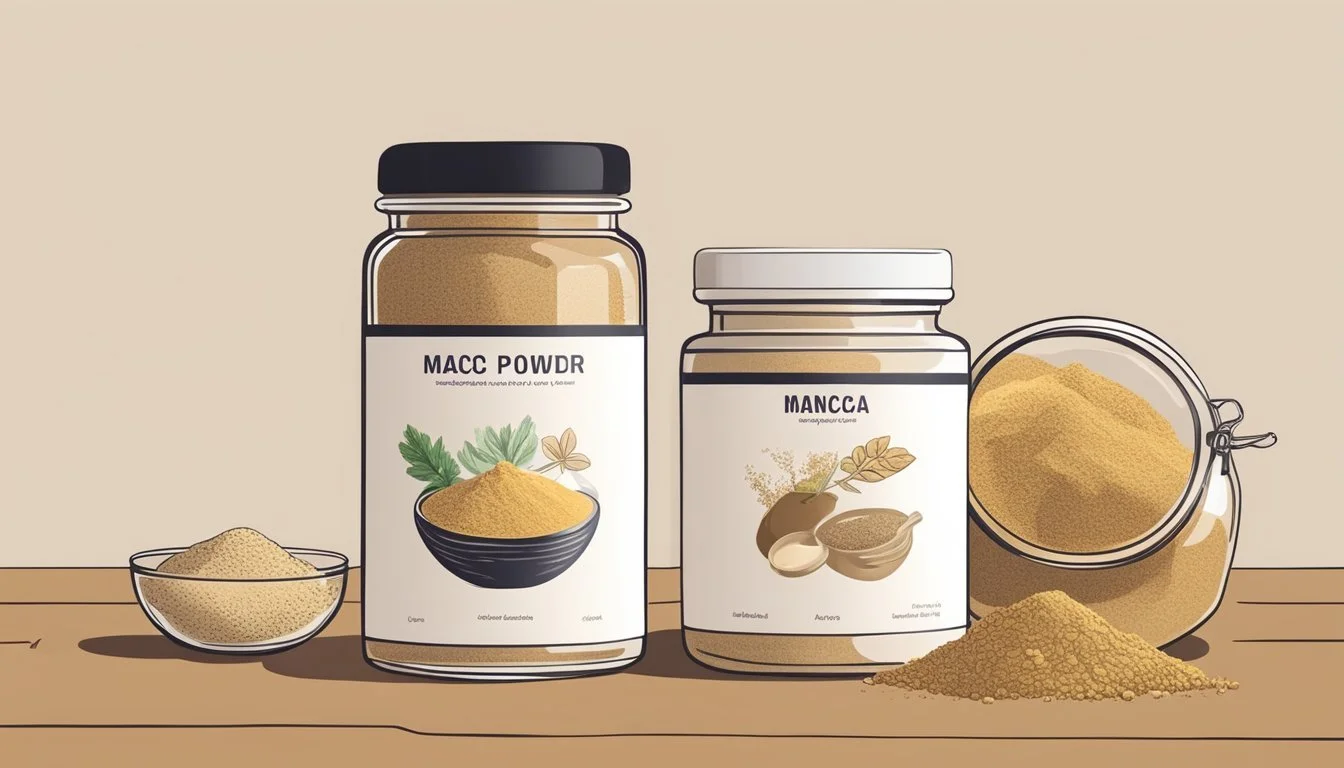Maca Powder Substitutes
Top Alternatives for Your Health Needs
Maca powder, known for its numerous health benefits, has become a popular superfood originating from South America. Whether you're making smoothies, energy balls, or baked goods, there are times you might need a substitute for maca powder. Ground chia seeds serve as an excellent alternative due to their mild, nutty flavor and versatile use in various recipes. Besides being high in fiber and omega-3 fatty acids, they can be used in both sweet and savory dishes.
Another viable substitute for maca powder is raw cacao powder. It shares an earthy, nutty flavor with maca and adds a slightly bitter aftertaste and fruity aroma, making it suitable for numerous recipes. Its rich chocolate flavor paired with high antioxidant content makes it a nutritious and delicious option for smoothies, desserts, and more.
For those seeking adaptogenic properties similar to maca, ginseng powder is a practical choice. Ginseng has been a cornerstone of traditional Chinese medicine for its rejuvenating benefits. Its flavor may differ, but its health benefits closely align with those of maca powder, providing a solid substitute in health-focused recipes.
Understanding Maca Powder
Maca powder, derived from the Peruvian root vegetable maca, is known for its unique nutty flavor and numerous health benefits. Its historical roots and its properties make it a sought-after ingredient for boosting energy and mood, supporting hormonal balance, and enhancing physical performance.
Origins and Properties of Maca
Maca, a root vegetable native to the Andes Mountains, has been cultivated for thousands of years. Resilient to harsh climates, this tuber is often termed as a "Peruvian ginseng".
The powdered form of maca retains much of its nutritional profile, including vitamins, minerals, and antioxidants. Maca powder typically has a nutty flavor, slightly sweet and earthy, which makes it versatile for both sweet and savory dishes.
Health Benefits and Uses
Maca powder is renowned for its health-boosting properties. As an adaptogen, it helps the body manage stress and improve overall well-being. The powder is rich in vitamins and minerals, contributing to increased energy levels, enhanced mood, and better physical performance.
Regular consumption is linked to improved libido, fertility, and hormonal balance. Its antioxidant properties aid in protecting the body from oxidative stress, making it a popular supplement in health and wellness circles. This makes maca powder an excellent addition to smoothies, baked goods, and various recipes for those seeking its benefits.
Common Maca Powder Substitutes
When maca powder is unavailable or unsuitable, several alternatives can replicate its flavor or nutritional profile. These substitutes range from cacao powders rich in antioxidants to various flour and root powders perfect for diverse recipes.
Cacao Powder and Raw Cacao Substitutes
Cacao powder is an excellent substitute for maca powder, especially in smoothies and desserts. It is rich in antioxidants and theobromine, which can aid in improving mood and providing energy. Raw cacao powder offers similar benefits with a more intense flavor, making it ideal for baking or chocolate-based recipes.
Both types of cacao powder contain nutrients that can support heart health and provide a rich, chocolatey flavor, which makes them useful in various culinary applications.
Grain-Based and Flour Substitutes
Almond flour and coconut flour are popular substitutes for maca powder in baking. Almond flour, made from blanched almonds, offers a nutty flavor and is a good source of protein and healthy fats. It works well in muffins, bread, and cookies.
Coconut flour is another option that brings a slightly sweet taste and is high in fiber. It's perfect for gluten-free recipes and can be used in porridges and pancakes.
These flours not only replicate some of the nutritional benefits of maca powder but also add unique flavors and textures to recipes.
Dried and Powdered Substitutes
Ginseng powder and yacon powder are notable substitutes featuring different nutritional profiles. Ginseng is known for its ability to improve energy levels and combat fatigue. It has a slightly bitter taste and can be added to smoothies or teas.
Yacon powder offers a mild sweetness and prebiotic properties, beneficial for digestive health. It can be used in both sweet and savory dishes, making it versatile in cooking.
Malt powder and malted milk powder can also replace maca powder, providing a malty flavor that complements shakes, desserts, and various baked goods. They are especially useful for recipes that call for a hint of sweetness and added texture.
Choosing Substitutes for Specific Applications
When looking for maca powder substitutes, it's crucial to match the substitute to your specific needs, whether it's for sweetness, drinks, or achieving a particular texture in your dishes. Here’s a guide to help you choose the best options for various culinary purposes.
For Sweetness and Flavor
For sweetness and flavor, ground cinnamon, honey, and molasses are excellent choices. Cinnamon adds a warm, sweet spice that complements baked goods and desserts. Honey provides a natural sweetness with floral undertones, perfect for adding to smoothies, teas, or yogurt.
Molasses offers a deep, rich flavor and can be used in baking recipes like gingerbread or molasses cookies. Ground butterscotch can also be a good option for a distinct, sweet caramel-like taste. Adjust the quantity to taste, as these substitutes can be potent.
For Smoothies and Drinks
When mixing up smoothies and drinks, matcha powder and instant coffee are viable substitutes. Matcha’s green tea catechins enhance energy and reduce stress, making it an excellent addition to smoothies. Instant coffee provides a robust flavor that pairs well with chocolate or vanilla protein shakes and can substitute maca in coffee-flavored beverages.
For those avoiding caffeine, cocoa powder or carob powder offer a chocolatey flavor without the buzz. Protein-rich shakes and juice blended with these powders can replicate maca powder’s benefits, providing energy and nutrients.
For Creaminess and Texture
To achieve creaminess and texture, coconut milk powder, soy milk powder, and milk powder are good alternatives. Coconut milk powder lends a rich, creamy consistency ideal for puddings, custards, and creamy beverages.
Soy milk powder is a plant-based option that can add thickness and protein, suitable for vegan recipes. Milk powder is a straightforward choice for a creamy texture, useful in soups, sauces, and baked goods.
Coffee powder can also add a unique texture and flavor, especially in desserts like tiramisu or coffee-flavored puddings. Experiment with quantities to get the right texture and flavor balance.
Nutritional and Health Considerations
Choosing an alternative for maca powder involves understanding the unique nutritional benefits it offers. These alternatives should ideally mimic the adaptogenic, energizing, and nutritional qualities of maca.
Adaptogenic and Herbal Alternatives
Ginseng is widely used in Chinese medicine and is celebrated for its adaptogenic properties. It helps in boosting energy levels, reducing stress, and enhancing overall well-being. Like maca, ginseng can support healthy blood pressure and improve endurance.
Matcha powder serves as another potent substitute. Containing green tea catechins, it boasts anti-inflammatory effects and aids in stress reduction. Matcha also contains caffeine, which provides a natural energy boost.
Spirulina, derived from blue-green algae, is rich in protein and omega-3 fatty acids. It supports weight loss and acts as an excellent source of various nutrients.
Evaluating Supplement Alternatives
Ground Chia Seeds are high in fiber and omega-3 fatty acids, making them a great option for digestive health and anti-inflammatory benefits. These seeds have a mild, nutty flavor that integrates well into different recipes.
Yacon Powder, rich in prebiotic fiber, aids in promoting healthy gut bacteria, which can improve digestive health and support weight management. Its sweet, earthy flavor can complement many dishes similarly to maca powder.
Raw Cacao Powder offers a rich source of antioxidants and minerals. It also has a slightly bitter, chocolatey taste, which can add depth to both sweet and savory dishes. It's a flexible ingredient for those looking to replicate the flavor profile of maca.
By carefully evaluating these alternatives, individuals can maintain their dietary and health goals while substituting maca powder in various recipes.
Integrating Substitutes into Your Diet
Integrating substitutes into your diet can be a seamless process if you understand their taste, texture, and best applications in various dishes. Identifying the key characteristics of each substitute will help you enhance your meals effectively.
Using Substitutes in Cooking
When using maca substitutes like ground chia seeds, raw cacao powder, and ginseng in your cooking, it's essential to measure them correctly and match their flavors with the other ingredients in your recipes. Ground chia seeds, for instance, have a mild, nutty flavor and can be added to both savory and sweet dishes.
For chocolate lovers, raw cacao powder offers a rich, earthy taste. It’s perfect for baking or adding to smoothies. Ginseng, with its distinct earthy and slightly bitter taste, can be included in soups and stews. Always start with a small amount, around 1-3 teaspoons, and adjust to taste.
Understanding Taste and Texture Complementarity
Each maca substitute brings unique textures and flavors that can complement or enhance your recipes. Ground chia seeds add a slight crunch and are high in omega-3 fatty acids and fiber. This makes them perfect for yogurt bowls, oatmeal, and baked goods.
Raw cacao powder, with its dark color and complex flavors, works well in chocolate-based desserts or as a flavoring in lattes. Ginseng needs careful balancing due to its potential bitterness, but its earthy notes can add depth to broths and teas.
Understanding how these substitutes interact with other ingredients will help you achieve the desired flavor profile without overpowering your dish. Consider the overall dish's taste and texture to make the most of these nutritional alternatives.
Purchasing and Storage Tips
When selecting and storing substitutes for maca powder, considerations include availability in grocery stores and proper storage techniques. These will ensure freshness and longevity of the product.
Finding Alternatives in Grocery Stores
Substitutes for maca powder are widely available in most grocery stores. Products like ground chia seeds, yacon powder, raw cacao powder, and almond flour can usually be found in the health food or baking aisles.
Chia seeds and raw cacao powder are particularly versatile and often stocked alongside organic and gluten-free products. When searching, check the labels for pure, unadulterated forms to maintain the intended nutritional benefits.
For those preferring liquid forms, options are limited but can still be found. Liquid extracts such as ginseng can often be sourced in the supplement section.
Storage and Shelf Life
Proper storage is key to maintaining the freshness and potency of powdered and liquid substitutes. Store them in airtight containers in a cool, dry place away from sunlight.
Powdered forms such as raw cacao and ground chia seeds generally have a long shelf life, often up to two years. Use moisture-absorbing packets to prolong their shelf life.
Liquid substitutes like ginseng extract should be stored in the refrigerator once opened and used within a few months. Always refer to the manufacturer’s instructions for specific storage recommendations.
Environmental and Ethical Considerations
When considering maca powder substitutes, it is important to evaluate the environmental impact and ethical sourcing of these alternatives. This ensures that choices are both sustainable and responsible.
Sustainability of Maca Farming
Maca farming, primarily in the Andes region of South America, faces challenges related to sustainability. Rising global demand has led to concerns about overharvesting and soil depletion. Some farming practices have been criticized for not being environmentally friendly, contributing to the degradation of this delicate ecosystem.
Implementing sustainable farming methods is crucial. These include crop rotation, organic farming practices, and protecting natural habitats. Proper resource management helps to mitigate negative environmental impacts and ensures the long-term viability of maca cultivation.
Ethical Sourcing of Substitutes
Ethically sourcing substitutes for maca powder is equally important. Ingredients like yacon powder, raw cacao, and ground chia seeds must be scrutinized to ensure they are harvested and processed in ways that do not exploit workers or harm the environment.
Fair trade certifications and organic labeling are key indicators of ethical practices. For example, fair trade ensures that farmers receive fair compensation and work in safe conditions. Organic certification guarantees that no harmful chemicals are used, protecting both the environment and the health of consumers. Ensuring this ethical consideration promotes responsible consumerism and supports communities involved in producing these substitutes.







